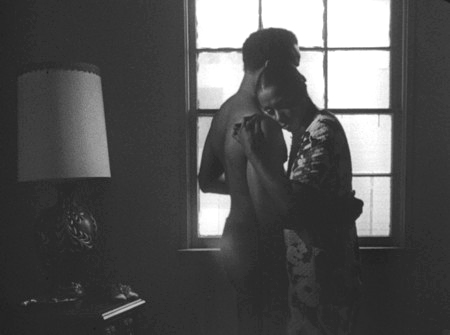|
Reviews of Recent Independent, Foreign, & Documentary Films in Theaters and DVD/Home Video
Edited, Photographed, Written, Produced & Directed by: Charles Burnett. Released by: Milestone Film & Video. Country of Origin: USA. 80 minutes. Not Rating. With: Henry Gayle Sanders, Kaycee Moore, Charles Bracy, Angela Burnett, Eugene Cherry & Jack Drummond. DVD Features: Disc 1 – Commentary. Three short films, “Several Friends” (1969, 23 min., b & w), “The Horse” (1973, 13 min., color), & “When It Rains” (1995, 13 min., color). Killer of Sheep cast reunion video by Ross Lipman (2007, 5 min.). Trailer. Disc 2 – Two versions of My Brother's Wedding (original 1983 release, 118 min., & 2007 director's cut, 83 min., color). Short film “Quiet As Kept” (2007, 5 min., color). Essay & technical notes on the film’s restoration.
Inspired by documentaries as much as Italian neo-realism, writer/director Charles Burnett creates a tribute to domesticity through a series of vignettes and a portrait of masculinity expressed unsentimentally through family, friendship, work, and marriage, which is still profoundly unusual in film. The magnetic center is Stan, played by Henry Gayle Sanders with coiled restlessness. Depressed and sleepless in his always-in-need-of-repairs home, the full weight of the world resting on his shoulders doesn’t become visible until he’s seen at his awful job at an abattoir (where the sheep to the slaughter symbolism gets repeated a bit too often). No wonder counting sheep doesn’t help him sleep. Stan skirts temptations from the liquor store to gamblers and is amusingly foiled by schemes that lack foresight, played out in extended sequences punctuated only by his friends’ rhyming commentary. He is kept on the straight and narrow by the love of a good woman, Kaycee Moore as his frustrated but caring wife. Even when he’s too tense to make love to her, he tenderly spends time with their young daughter. His old friends Smoke and Scooter try to entice him into wrongdoing, but his wife gets them to skedaddle in an improvised rant emphasizing the sanctity of their hearth and home as a shelter from the storm. The island of peace he and his wife create together is memorably realized through a lovely, intimate slow dance to Dinah Washington’s “This Bitter Earth,” a song repeated over the closing credits when he has finally stopped pulling away from her. In the delicate domestic scenes, captured in intimate chiaroscuro against windows and door ways, Burnett’s quiet triumph gloriously trumps decades of stereotyped images of black men and women in film.
Peopled by non-professional actors, it takes a neighborhood to raise children here, as they play amidst bullies, rubble-strewn lots, and railroad
tracks. Burnett’s camera is like a peeping child on lazy summer weekends, looking up wide-eyed at adults and easily distracted by laundry being hung
out to dry, a teasing neighbor, or an overheard record.
From the opening lullaby, Burnett’s song selection adds a deep layer of feeling and meaning to each scene, but the music is why the film hasn’t been
able to be distributed up to now without additional funding. Burnett produced the film as his M.F.A. thesis. With no plans for public showings, he didn’t get the
rights to his carefully chosen soundtrack that includes Louis Armstrong, Arthur Crudup, Lowell Fulsom, Elmore James, Scott Joplin, Little Walter,
Paul Robeson, and Earth Wind & Fire. The blues particularly resonates when characters recall their Southern country roots.
DVD Extras: Filmmaker Burnett is prodded to explain in the Q and A commentary track with Richard Peña, program director of the Film Society of Lincoln Center, that he was inspired by the aesthetics of still photography “to hold the gaze.” Increasing the admiration of his film, the DVD format allows the freezing and repeating of his striking images, like the dialogue-free dance between husband and wife, and so much more in a masterpiece that is mouth dropping in its beautiful perspectives of everyday black working-class life still ignored by movies today. (Film critic Armond White, in his un-illuminating essay, describes one arresting shot, of boys leaping over rooftops, as suicidal; Burnett demurs, saying that’s an adult view of child’s play.) Though Burnett is otherwise reticent about the film’s aesthetics, Peña does get him to reveal that his initial concept was to make a three-part epic story on how Stan comes out of his depression, the autobiographical and musical inspirations, and the technical aspects of making the movie only on the weekends.
Of his old and new short films, “The Horse,” with its fresh African-American dimension, is the stand-out revelation, an original take on Westerns
like Shane and 3:10 to Yuma that focus on a boy, a horse, and a gun. “Several Friends” is in the same male camaraderie vs. family
obligations vein as his second feature, My Brother's Wedding – the producers’ as well as the director’s cuts of this film are also included in
the set. Both “When It Rains” and his recent “Quiet as Kept” are more didactic, dealing with the issue of self-help vs. outside aid for black
communities. The latter, about post-Katrina life, is less effective than any of Jonathan Demme’s recent series of shorts in
Right to Return: New Home Movies from the Lower 9th Ward. Nora Lee Mandel
|

